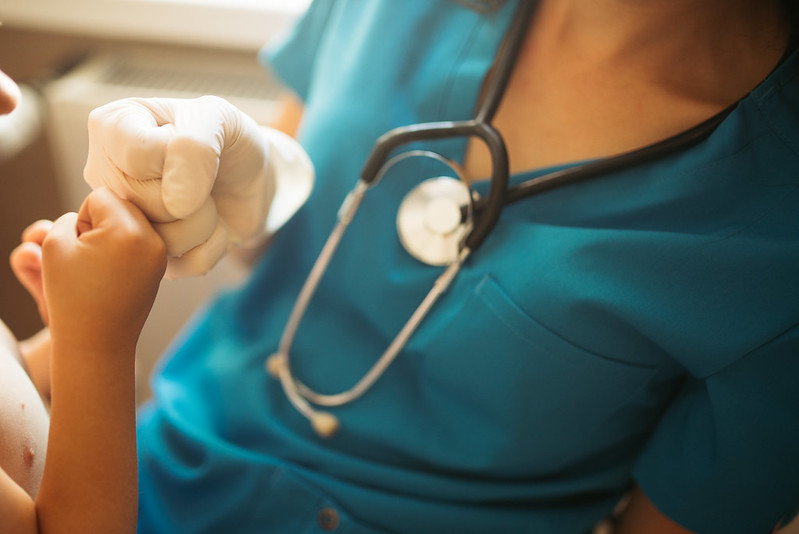During my OB/GYN rotation, one of my primary roles as a medical student was to observe and assist during labor and delivery (L&D). However, to be honest, I don’t think I touched a single baby in the entire six weeks. What I did regrettably lay my hands on over and over again was the placenta. I consider the placenta — that hematogenous, life-sustaining, gelatinous mass — to be the most alien-like structure in human anatomy. There is good reason why you rarely hear about or see the placenta on TV.
My skills were rough at first. I even needed reminders to apply suprapubic pressure to not invert the uterus while delivering the placenta (my apologies to the residents). Eventually, I grew accustomed to manipulating the umbilical cord and wrangling that fleshy mass out of each mother’s body. But as per usual in medical school, a moment of learned proficiency clashed with humorous ineptitude in a matter of seconds.
On one particularly memorable Friday afternoon, after we welcomed a healthy baby boy into our world, I delivered the placenta wholly intact on my own. This feat impressed my chief resident and OB/GYN clerkship director, who were both in the delivery room with me. Moreover, this was the placenta of a COVID-positive mother in her first pregnancy. Needless to say, I felt proud of my performance and for helping this new mother. I remember thinking at the time, “Not only did I perform well in front of people who directly impact my grade, but I also showed my dedication to patient care by doing it with a COVID-positive patient!”
However, while I felt satisfied with a job well done, something was dripping down my leg. I looked down and saw my scrub pants soaking in blood. COVID-infected blood. Straight from a woman’s placenta. The chief resident and attending were in the middle of complimenting me when they noticed it too. “It’s no big deal,” they said while holding back a chuckle. “This stuff happens on L&D.” They told me to help the nurses clean up the patient and then clean myself up too. Whatever satisfaction I had felt quickly evaporated into thin air as I processed my situation.
I had not come prepared for this scenario. I had not packed an extra set of scrubs or brought other clothes with me. Students were not granted access to the L&D locker rooms or scrub machines. Only a month into my rotations at this point, I knew of only one other scrub machine and it was naturally on the opposite side of the hospital. Needless to say, my options were limited.
Minutes later, with my head down, I speed-walked through the atrium of our massive hospital. With one leg soaked in blood, I felt unsure of whether to feel embarrassed or to laugh at my situation. A classmate saw me and called out in greeting from across the atrium. I silently waved and motioned to my bloodied pants. Shortest conversation of my life in 2021.
When I finally reached the student-accessible scrub machine across the hospital, I breathed a sigh of relief. But only for a moment. To obtain a new pair of scrubs, I was first required to deposit an old pair. I breathed another deep sigh. Not of relief, but of defeat. And then I chuckled. My moment of pride in delivering the placenta stood in complete opposition to what I was about to do.
So, there I stood in my socks and Pokémon boxers in the middle of a hallway, frantically entering my pin number to get new scrubs, hoping and praying that no one walked by. I had barely finished tucking in my scrubs before someone actually did walk by. Thanking my luck after this nightmare of near-public indecency, I headed back to the L&D floor. Despite my anxiety from being nearly seen naked in public, I like to imagine that Charizard and Pikachu at least had an entertaining field trip that day.
Months later, this experience still epitomizes the dichotomy of my clinical rotations in medical school – one moment you impress your evaluators and feel like a budding physician. The next moment your leg is soaked in blood and then you’re stripping down in a hospital hallway. More often than not, it is key to take neither your successes nor your shortcomings throughout your medical training too seriously. We roll with the punches that the wards inevitably throw at us, we learn from our experiences, we sometimes find humor in them and then we move forward. I would, however, recommend dodging any placental fluids if you find yourself in the splash zone. Or at least pack an extra pair of scrubs.
Image credit: The doctor and the child are greeted (CC BY 2.0) by shixart1985

